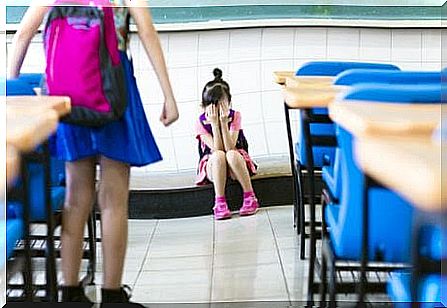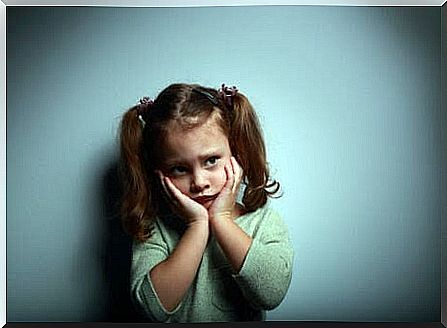Fear Of Failure: How To Avoid It In Children

When children have a fear of failure, it affects their potential, and it can also often lead to them feeling weak, vulnerable, demotivated, incompetent and therefore stop trying to move on.
The word “failure” often causes great fear even among adults. It is usually a consequence of the fact that they have been brought up with punishment and negative consequences when they have done something wrong.
When mistakes are something that leads to ridicule, contempt or rejection, it becomes difficult for someone to take advantage of opportunities. It then affects that person’s growth and development, and the person has difficulty taking advantage of opportunities in everyday life.
Not daring to take a chance and fight for what you want reduces your quality of life and does not give you a good life. We will talk more about this in this article.
If you think your child has a fear of failure, it is best to help him or her overcome it. We discuss some effective methods below.
Characteristics in children with a fear of failure
- Stress.
- Anxiety.
- Depression.
- Insulation.
- Low self-esteem.
- Low tolerance for criticism (even constructive).
- Inadequate immune system (because the immune system is weakened).
- Fear of expressing ideas, thoughts and feelings. The child may also be afraid of being outspoken and causing trouble.
The fear of failure is easy to detect in children. They are usually afraid of being evaluated and rejected for what they do. As a result, they tend to be very careful and avoid contact with other people.

They also tend to feel uncomfortable and anxious when performing certain tasks for fear of making mistakes.
If they in the family environment are often punished for their mistakes, they will also feel very scared. It will gradually create mistrust of the parents, which can seriously affect the relationship with them.
Fear of failure prevents children from taking risks and giving themselves opportunities to explore the world. Therefore, their experiences are usually bad.
Children may also be afraid of not being successful, and because of this they may refuse to take on projects. This insecurity and lack of self-confidence will then affect many aspects of the child’s life.
What can give rise to a fear of failure?
- Perfectionism.
- Lack of focus.
- Projections of the children’s parents.
- Physical and psychological abuse (ridicule, punishment, sanctions, etc.).
When parents push their children too hard to be perfect in everything they do, they create a distorted reality for them. In the long run, it prevents them from feeling mentally well.
Unfortunately, the media also often contributes to children’s fear of failure.
How? Well, by spreading the idea that a failed person looks ugly, has no prestige, no friends, little (or no) capacity and, in short, is a loser.
In addition, the concept of a “winner”, or a competent person, has been reinforced by material things (such as toy divers) and in the volatile world of advertising and commerce.
Ways to overcome fear
A failure is not the whole world. Failures or mistakes give us opportunities to grow, expand our analytical capacity, learn, correct what went wrong and move forward much stronger and wiser. And it is very important that we let children know.
It is important that children learn to overcome their fears for their own sake. They must also know that they are loved and that they receive affection, advice and support from their parents. This is how we can strengthen their capacity, guide them and give them security, respect and understanding.
They should also be constantly reminded that one can overcome a failure and that it does not always result in an unpleasant experience. Many times mistakes leave us with funny anecdotes and stories.
Let us show them what they can change and help them with what they cannot do on their own. This makes it easier for them to understand that the label “loser” or “failure” does not define us or mark us for life.

Ways to help children
- Appreciate their efforts. For example, even if they do not get the highest score on a test, but they tried the best they could, you need to evaluate their effort and motivate them to try again next time.
- The goals must be realistic and appropriate. It is important to teach them and encourage them to set sensible goals that they can achieve. Goals that are within their reach and that they can measure. It is the best way for them to later evaluate the effort they put into achieving their goals.
- Encourage them not to give up. We must cheer on them and encourage them to continue, not to give up or give up on tasks and goals they have set for themselves at the first sight of a mistake or failure. It is important to be realistic, but it is also important to insist that a greater effort can provide better results and valuable experiences.

- Parents must be good role models. The influence of the parents is important. As parents, we are role models and examples for our children to follow, especially during the first years. It is impossible to teach them, let alone demand things from them, if we do not show them by being the example we seek and by achieving the results we expect. Make sure you are not the reason your children are afraid of failure.
- It is important not to be overprotective. In order for your children not to be afraid of failure, you must not prevent them from encountering problems and difficulties, let alone do everything for them. It is much better to teach them that they can take care of themselves.
- Do not be too permissive. Children, of all ages, need guides, role models and examples to help them take on challenging tasks. And their best role models are us, their parents. Do not let them learn everything outside the home. We must prioritize their education at home.









